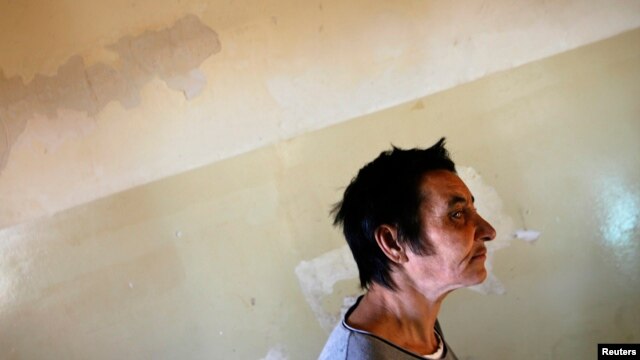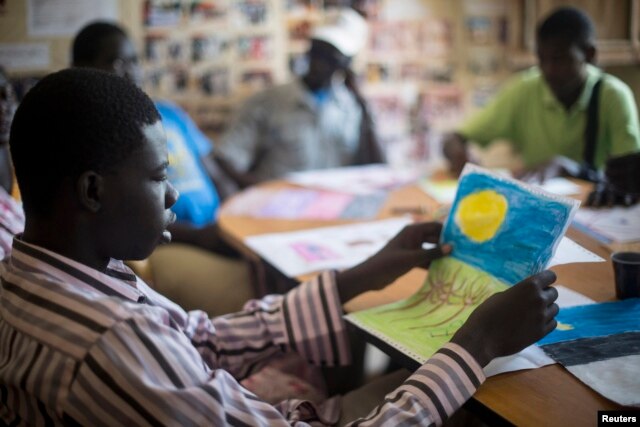Navigation
Install the app
How to install the app on iOS
Follow along with the video below to see how to install our site as a web app on your home screen.
Note: This feature may not be available in some browsers.
More options
You are using an out of date browser. It may not display this or other websites correctly.
You should upgrade or use an alternative browser.
You should upgrade or use an alternative browser.
Simplifying childhood may protect against mental illness.
- Thread starter Mindful
- Start date
waltky
Wise ol' monkey
Spotlight on mental health...
World Health Authorities to Focus on Mental Health
April 13, 2016 - Mental health and the costs and benefits of treatment are taking center stage at a Washington, D.C. meeting co-hosted by the World Bank and World Health Organization starting Wednesday.
See also:
WHO: Better Mental Health Treatment Would Boost Nations' Economies
April 12, 2016 — Every dollar spent on better treatment of anxiety and depression produces a return of $4 in better health and ability to work — a big boost for countries' development and economic growth, the World Health Organization said Tuesday.
Related:
UN: Wealthy Countries Failing Disadvantaged Children
April 13, 2016 — A U.N. children’s fund study has found a widening gap between poor and richer children in the world’s wealthiest countries. The UNICEF report ranking the well-being of children in 41 high income countries analyzes the consequences of this growing inequality.
World Health Authorities to Focus on Mental Health
April 13, 2016 - Mental health and the costs and benefits of treatment are taking center stage at a Washington, D.C. meeting co-hosted by the World Bank and World Health Organization starting Wednesday.
Academic experts, practitioners, development agencies, and ministers of finance are participating in the meeting designed to encourage governments, aid agencies, and civil society to invest in mental health. Organizers say good mental health care can result in real economic benefits. Nations that have improved their mental health care, such as Brazil, Ethiopia, and South Africa, will present their stories, discussing their particular challenges and solutions.

A patient is seen walking toward a group therapy room at a mental health institution in the Balkans.
Authorities from Brazil are expected to describe their psychosocial care network, while Ethiopian representatives are to showcase their country's program of nationwide mental health care training and practice. South Africans will talk about how they made mental health care an integral part of the nation's re-engineered primary health care system. The series of events is part of the annual spring meeting of the World Bank and the International Monetary Fund and coincides with the release of a WHO-led study that shows every $1 invested in improving mental health treatment results in a return of $4 in better health and ability to work.
The study says an estimated 10 percent of the world's population is affected by mental health disorders, and in emergency situations, as many as 1 in 5 people can be affected by depression and anxiety. Calculating the cost of treatment and health outcomes in 36 countries of all income levels over the next 15 years, the study predicted that the cost of scaling up treatment through counseling and anti-depressant medication amounted to about $147 billion. The study says the benefits of better mental health far outweigh the cost, noting that a 5 percent improvement in labor force participation and productivity is valued at $399 billion. Improved health is estimated to add another $310 billion in returns.

Patients undergoing a rehabilitation program draw during a therapy session at the Sopi Jikko center for people with mental health and drug addiction problems in Dakar.
The WHO says nations need to drastically upgrade their spending on mental health care. A 2014 survey shows governments spend an average of just 3 percent on mental health, ranging from 5 percent in high-income countries to less than 1 percent in developing nations.
World Health Authorities to Focus on Mental Health
See also:
WHO: Better Mental Health Treatment Would Boost Nations' Economies
April 12, 2016 — Every dollar spent on better treatment of anxiety and depression produces a return of $4 in better health and ability to work — a big boost for countries' development and economic growth, the World Health Organization said Tuesday.
These disorders cost the global economy $1 trillion a year, according to a study led by WHO, which estimates for the first time both the health and the economic benefits of spending more on treating the most common forms of mental illness. Common mental disorders such as anxiety and depression are increasing worldwide, and the number of people suffering from them rose to 615 million in 2013 from 416 million in 1990, the U.N. agency said in the study.

A sign on mental health awareness is posted in Cambodia.
Last year, world leaders included mental health in an ambitious plan to end poverty and inequality by 2030, enshrined in 17 Sustainable Development Goals. "We know that treatment of depression and anxiety makes good sense for health and well-being; this new study confirms that it makes sound economic sense, too," said Margaret Chan, director-general of WHO. "We must now find ways to make sure that access to mental health services becomes a reality for all men, women and children, wherever they live," she added. The study, published in the same week as the World Bank and WHO hold a high-level meeting on mental health, is based on data from 36 low-, middle- and high-income countries.
‘Need to act now’
Governments spend, on average, 3 percent of their health budget on mental health, ranging from less than 1 percent in low-income countries to 5 percent in high-income countries, according to WHO's survey Mental Health Atlas 2014. "Despite hundreds of millions of people around the world living with mental disorders, mental health has remained in the shadows," said Jim Yong Kim, president of the World Bank Group. "This is not just a public health issue — it's a development issue. We need to act now because the lost productivity is something the global economy simply cannot afford," he added. The World Bank/WHO meeting takes place Wednesday, during the World Bank/International Monetary Fund Spring Meetings also taking place in Washington.
It brings together ministers of health and finance, as well as donors and multilateral organizations, and aims to move mental health to the mainstream of the global development agenda from the margins. "Mental health needs to be a global humanitarian and development priority — and a priority in every country," said Arthur Kleinman, professor of medical anthropology and psychiatry at Harvard University and an expert on global mental health. "We need to provide treatment, now, to those who need it most, and in the communities where they live. Until we do, mental illness will continue to eclipse the potential of people and economies," he added.
WHO: Better Mental Health Treatment Would Boost Nations' Economies
Related:
UN: Wealthy Countries Failing Disadvantaged Children
April 13, 2016 — A U.N. children’s fund study has found a widening gap between poor and richer children in the world’s wealthiest countries. The UNICEF report ranking the well-being of children in 41 high income countries analyzes the consequences of this growing inequality.
The gap between rich and poor in most wealthy countries is at its highest level in three decades. The new UNICEF study uses four indicators - income, education, health and life satisfaction - to measure the growing inequality between children at the bottom and those in the middle in high income countries.
UNICEF social policy economic specialist Yekaterina Chzhen says the 41-country rankings are based on how far children at the bottom of the distribution fall below their peers in the middle. “Countries like Denmark, Finland, Norway, Austria and Switzerland do best overall, while countries like the United Kingdom and the United States are right in the middle. At the same time, at the bottom of the overall ranking, we have countries like Turkey, Israel, Bulgaria and Italy,” said Chzhen.

Children at a predominately African-American Islamic school in Baltimore.
The report shows income inequality has increased substantially in one-third of the countries studied between 2008 and 2013. It finds inequality gaps in educational achievement have narrowed. At the same time, inequality in children’s health has increased in almost all countries. It notes some improvements also have been made in physical activity and healthier eating among poor children in a majority of the countries.
Chzhen told VOA some of the richest countries are letting their most disadvantaged children fall far behind all others; but, she says the report presents a mixed picture in that some nations that do badly overall do quite well on other indicators. “So, a country like the United States that is known for its high levels of income inequality overall, quite unsurprisingly, does quite badly on the measure of bottom-end inequality among children; but, at the same time, it ranks quite highly on the measure of inequality in education,” said Chzhen. Chzhen said poor children do better in countries that have well-established welfare systems and redistribution of income between the richest and poorest. The Nordic countries tend to fall into this category.
UN: Wealthy Countries Failing Disadvantaged Children
Last edited:
Bonzi
Diamond Member
- May 17, 2015
- 43,036
- 16,023
- 2,290
Unfortunately, many parents try to live vicariously through their kids.
Our job is to raise well adjusted, responsible, healthy and happy adults.
When we use our children to make ourselves look better by trying to "keep up with the Jones'" OR, worry about our kids feeling left out because they do not have or are not going what "all the other kids are doing" we are doing them a disservice.
This is telling them their self worth is based on WHAT OTHERS THINK.
We should teach our children to accept and love themselves for who they are and for them to embrace their passions and dreams.
Not force them into a mold we think they should be in or a mold in which we feel they SHOULD be in (and not embarrass us / the parents)
Like anything else. There are never easy answers.
Unfortunately, schools are also requiring massive activities of children. It's not longer good enough to have good grades for college.
You have to have a laundry list of "other" accomplishments and activities, which, not every person/child is cut out for.
Our job is to raise well adjusted, responsible, healthy and happy adults.
When we use our children to make ourselves look better by trying to "keep up with the Jones'" OR, worry about our kids feeling left out because they do not have or are not going what "all the other kids are doing" we are doing them a disservice.
This is telling them their self worth is based on WHAT OTHERS THINK.
We should teach our children to accept and love themselves for who they are and for them to embrace their passions and dreams.
Not force them into a mold we think they should be in or a mold in which we feel they SHOULD be in (and not embarrass us / the parents)
Like anything else. There are never easy answers.
Unfortunately, schools are also requiring massive activities of children. It's not longer good enough to have good grades for college.
You have to have a laundry list of "other" accomplishments and activities, which, not every person/child is cut out for.
waltky
Wise ol' monkey
Sometimes I feel so unnecessary...
Why feeling like a fraud can be a good thing
Sun, 24 Apr 2016 - Why it can be good to feel like you're a fraud
Why feeling like a fraud can be a good thing
Sun, 24 Apr 2016 - Why it can be good to feel like you're a fraud
If you feel inadequate or that you are likely to be "found out" at work, you're probably not alone. It's part of a phenomenon called the "impostor syndrome" and it's very common, writes journalist Oliver Burkeman. "I have written 11 books but each time I think 'Uh-oh, they're going to find out now,'" the novelist Maya Angelou once said. "I've run a game on everybody, and they're going to find me out." Angelou was nominated for the Pulitzer Prize, and won five Grammys for her spoken recordings, plus a myriad other awards. But the "impostor phenomenon" - sometimes known as impostor syndrome - had her firmly in its grip. Public acclaim didn't dent the feeling that, deep down, she was a fraud, who didn't have a clue what she was doing.
You've probably felt the same. Most of us have. Yet a crucial element of the impostor phenomenon is the sense that you're the only person to suffer. So you may not find it reassuring to learn that Angelou felt it too. "Sure," you tell yourself, "she thought she was a fraud - but I really am one. And any day now, I'll be rumbled." But the truth is you're far from the only sufferer. I have discovered the impostor phenomenon lurking in the minds of authors, artists, musicians, businesspeople - even a brain surgeon. "Part of you knows you're not as good as you're pretending to be," says Henry Marsh, a neurosurgeon and author of the memoir Do No Harm. "But you have to come across as being relatively competent and confident."

Author Frances Hardinge won the 2015 Costa Book of the Year Award for her novel The Lie Tree - but still, she says, with every new project, there's a "part of my brain that tells me that this is the book… where I disappoint everybody, and people see me for the fraud I am." The underlying fear, says artist and musician Amanda Palmer, "is that someone's going to come knocking at the door. "I call these fictional people the Fraud Police, and they're just going to tell you: 'We figured it out, and we're taking it all away.'" It's long been noted that women seem to experience impostorism more frequently and acutely than men, probably because of pre-existing sexist stereotypes that call their professional competence into question.
Also, according to impostorism expert Dr Valerie Young, women are more likely to explain setbacks and failures as resulting from their lack of ability, while men are more prone to blame outside factors. But nobody is immune - and though the phenomenon was first identified in the 1970s, psychologists say it seems to be ever more relevant in today's hyper-competitive, economically insecure world. "Despite often overwhelming evidence of their abilities, impostors dismiss them as merely a matter of luck, timing, outside help, charm - even computer error," Young writes in The Secret Thoughts of Successful Women.
Find out more
Granny
Gold Member
For God's sake, let 'em play and have fun and get hurt and fail and learn to get up and try again. It's what life should be about
Aaaahhh ... those were the days - didn't need no full hockey gear to ride a bike - didn't grow up from cowboys 'n' indians to mass killers - kids could just be kids and have some fun ..............
Granny
Gold Member
Something from my favorite book, The Prophet
On Children, The Prophet, a poem by Kahlil Gibran with animation and sound
On Children, The Prophet, a poem by Kahlil Gibran with animation and sound
waltky
Wise ol' monkey
90% of alcoholics come from alcoholic homes...
Do you inherit your parent's mental illness?
Tue, 10 May 2016 - In the battle to find what causes mental illness, scientists are increasingly looking at genetic factors. For James Longman - whose father killed himself after suffering from schizophrenia - it's a very personal question.
See also:
Five signs that you're being emotionally abused
Wed, 11 May 2016 - Hashtag starts conversation about mistreatment in relationships.
Do you inherit your parent's mental illness?
Tue, 10 May 2016 - In the battle to find what causes mental illness, scientists are increasingly looking at genetic factors. For James Longman - whose father killed himself after suffering from schizophrenia - it's a very personal question.
I'm often told I look like my dad, that I have his mannerisms and some of his habits. It's something I take pride in. But it's also something that worries me because he had schizophrenia, and when I was nine, he took his own life. After a particularly bad two-week episode, he set fire to his flat in London, and threw himself out of a window. Some of the details of his life and death have only become clear while looking into this story. Multiple suicide attempts; walking around London in just a bathrobe; hearing voices. They are details that contrast so strongly with the man I remember from when he was well - happy, creative and funny. Twenty years earlier, his own father - my grandfather - had shot himself after finding out he had cancer. I also have other family with mental health issues. Now in my twenties I sometimes struggle with depression. So I naturally think - is this something that runs in my family?
Find out more
James Longman's film is on the Victoria Derbyshire programme. Watch the programme on weekdays between 09:00 and 11:00 on BBC Two and the BBC News Channel. For a lot of people, mental health is a difficult thing to talk about. But those who deal with these issues can often point to family members with similar problems. Do I get depressed because of the trauma of losing my father in such tragic circumstances? Or is it written into my DNA? At King's College London (KCL), researchers have been looking into the genetics of mental health. Studies into twins and family histories have proved that mental health illnesses have a genetic contribution. But it's only in the past few years scientists have been able to fully identify the genetic changes that might be causing that increase in risk.

James Longman at his father's grave
Prof Cathryn Lewis, a researcher from the NIHR Maudsley Biomedical Research Centre explains: "It's really hard to identify the genetics for mental health disorders. We learn at school about simple Mendelian [relating to the laws of Gregor Mendel] diseases - like Huntington's or cystic fibrosis - where there is the gene, a single gene that contributes to it. "Mental health disorders are not about a single gene but about a collection of genes. We need to start thinking about this as a cumulative loading of genetics." The work at KCL is still in its early stages. But it has been found there are 108 genes with changes in people with schizophrenia. Now, nine genes have been found across those with depression, and 20 in people who have bipolar disorder. There are almost certainly many more still to find and scientists say many of these genes will be shared across the different conditions.
Making sense of my genetic legacy is important, because it allows me to break away from the feelings of inevitability that depression gives you. Is this meant to happen? Am I meant to get over this? Is this bigger than me? "Evidence from the last few years also suggests that many mental disorders share common genetic risk factors - for instance, genetic variation associated with schizophrenia overlaps with both depression and bipolar disorder," says Lewis. My father's schizophrenia has not been passed down to me - as I haven't experienced any of the symptoms I would have had by now - but perhaps some of the genetic coding we share has caused me to experience depression.
MORE
See also:
Five signs that you're being emotionally abused
Wed, 11 May 2016 - Hashtag starts conversation about mistreatment in relationships.
When Dominican-American writer Zahira Kelly started the hashtag #MaybeHeDoesntHitYou, she had no idea that it would trend with thousands of women, and even a few men, taking the opportunity to discuss their own experience of psychological maltreatment. "Abuse is often seen as very cut and dry, and only physical. For several years now on social media, on a daily basis I talk about many different forms of abuse and what they look like," Kelly told Trending. She added that she created the hashtag in order to enable people to be able to "suss out damaging situations." And counsellors agree with Zahira that there are signs of identifying whether you are being emotionally abused. We isolated a few from the tweets on Kelly's trend.
Other people think they're great
"Emotionally abusive people are very concerned with their public image," counsellor Amanda Perl told Trending. "They are often extremely charming to the outside world in order to undermine any case you might have to discredit them or bring a spotlight on their behaviour."
Mock you
"They publically embarrass you. That can include on social media too, where they reveal anecdotes designed to get a laugh at your expense. If you aren't laughing and they continue with this behaviour, it is a form of emotional abuse," says Perl.

Writer Zahira Kelly
Won't see your point of view
"This is a form of 'stonewalling'. When your partner refuses to engage in conversation or deflects on issues that concern you and manipulates you into believing your point of view is not valid," says Perl. "It's another form of control."
Use things you've said against you
"These can range from how many sexual partners you've told him you've had to any form of deviance; whether it's a sexual fantasy or something you wouldn't want anyone to know." says Perl.
Try to make you jealous
"There is a difference between people who are physically and emotionally abused." Perl says. "Abusers often suffer with unmanageable anxiety and so look for partner who can compensate for this inadequacy. The emotionally abused are generally secure and intelligent people. They aren't meek. However they are generally co-operative, facilitative and can be natural people pleasers." Zahira Kelly told Trending that it was not one isolated experience that caused her to create the hashtag, and she has given more context to her personal story in this blog. She said she wanted to let abused people know that they "were not imagining the horrible emotional and psychological effects of what you experienced. Even if it doesn't qualify as abusive under common notions that only validate physical abuse, it's still real and your pain is real. And you deserve so much better. We all do."
Five signs that you're being emotionally abused - BBC News
Granny
Gold Member
I think emotional abuse is far, far worse than physical abuse (based on my own experiences). I recognize that physical abuse can be so horrific in some cases that there is permanent damage from which there is no recovery but the "lesser" physical damage - bruises or a broken bone will heal ... it's the mental and emotional aspect, the memories, that linger sometimes for the rest of one's life. On the other hand, I also know that the human brain is amazing in that it has a built in protection of burying some things that are so painful very deep out of memory ... another thing takes over in the brain to "cover" that memory.
Skull Pilot
Diamond Member
- Nov 17, 2007
- 45,446
- 6,164
- 1,830
Today we have helicopter parents and an epidemic of learned helplessness
Granny
Gold Member
Today we have helicopter parents and an epidemic of learned helplessness
Skull Pilot!!!!! You're a Chrisley fan??!! He does hover ... BUT education is high (in a whole bunch of ways) on the priority list!
On the serious side, I would say that we also have way too many parents who are so wrapped up in their own world of priorities that they neglect their token children.
Skull Pilot
Diamond Member
- Nov 17, 2007
- 45,446
- 6,164
- 1,830
A who fan?Today we have helicopter parents and an epidemic of learned helplessness
Skull Pilot!!!!! You're a Chrisley fan??!! He does hover ... BUT education is high (in a whole bunch of ways) on the priority list!
On the serious side, I would say that we also have way too many parents who are so wrapped up in their own world of priorities that they neglect their token children.
Granny
Gold Member
A who fan?Today we have helicopter parents and an epidemic of learned helplessness
Skull Pilot!!!!! You're a Chrisley fan??!! He does hover ... BUT education is high (in a whole bunch of ways) on the priority list!
On the serious side, I would say that we also have way too many parents who are so wrapped up in their own world of priorities that they neglect their token children.
O-tay!! You're NOT a Chrisley fan! It's a reality show - "Chrisley Knows Best" on USA network - the only reality show I watch - it's just too, too funny. Anyone who has children should be able to relate to the generational practice of kids doing things to out-wit their "brainless" parents ... sublimely ignorant of the fact they aren't doing anything their parents haven't already done before them. Chrisley was brought up really poor - his parents, like other parents in their little town, worked in cotton mills. He became a self-made multi-millionaire. You should be able to check the show out online.
Similar threads
- Replies
- 3
- Views
- 241
- Replies
- 6
- Views
- 97
- Replies
- 4
- Views
- 498
- Replies
- 67
- Views
- 515
- Replies
- 61
- Views
- 937
Latest Discussions
- Replies
- 4K
- Views
- 55K
- Replies
- 2K
- Views
- 45K
- Replies
- 396
- Views
- 2K
- Replies
- 4K
- Views
- 60K
Forum List
-
-
-
-
-
Political Satire 9261
-
-
-
-
-
-
-
-
-
-
-
-
-
-
-
-
-
-
-
ObamaCare 781
-
-
-
-
-
-
-
-
-
-
-
Member Usernotes 497
-
-
-
-
-
-
-
-
-
-